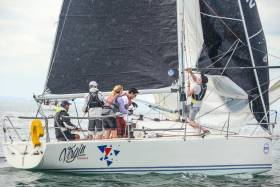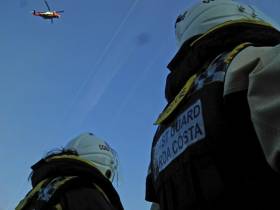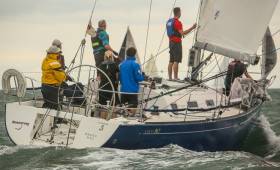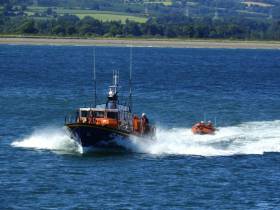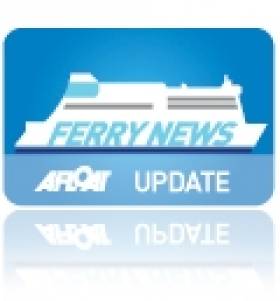Displaying items by tag: Greystones
140–boats are expected off the coast of County Wicklow for the two–race 'Taste of Greystones Trophy' later this month.
Greystones Sailing Club (GSC) will be keeping its fingers crossed for better winds than two years ago when the 2017 edition sets sail this August 26th. In 2015, the event was becalmed and rescheduled but its been the only blot for the newest east coast regatta that has been a runaway–success for the traditional dinghy club. GSC has also been embracing cruiser–racing since the new marina opened in the harbour, four years ago.
Started in 2013, by Greystones Sailing Club, the new cruiser event has focused on the 'social experience Greystones village offers', according to club Commodore Daragh Cafferkey, a regular ISORA sailor.
Clubs from Howth, Clontarf, Poolbeg, Dublin Bay, Bray, Wicklow, Arkow and Courtown – and perhaps some from as far afield as Wales too – are expected in Wicklow for the regatta sponsored by marina operator BJ Marine.
#Newbuild - A new customer for Mooney Boats of Killybegs, Spirit of Rathlin in which Afloat previously reported calling to the yard for work can now be further revealed, writes Jehan Ashmore.
The 6 vehicle / 140 passenger ferry Spirit of Rathlin according to Rathlin Ferry Ltd state they wish to announce a launch date very soon! The route is between Ballycastle on the mainland and Church Bay, and the £2.8m newbuild was constructed by Arklow Marine Services. In February vehicle loading trials of the ferry took place in Greystones Harbour.
The investment was funded by the Northern Ireland Department for Infrastucture (dfi) that awarded the contract to operate the vessel to Rathlin Ferry Co. Under the terms of the charter contract, the new ferry is to provide services to Northern Ireland’s only inhabited island for the next decade.
A delivery voyage by Spirit of Rathlin to the Antrim island had taken place in April, however the additional work required attending the Donegal yard. The type of work involved according to Mooney Boats is listed below:
Alterations to Front Ramp Hydraulics
Diesel gaskets replaced throughout vessel
Resealed coolers
Washed & Painted vessel
Supplied new glavanised anchor chain
Sandblasted and metalized anchors for vessel
When the 28m newbuild enters service, she is to directly replace the ageing Canna. At more than four decades old the ‘Island’ class car-ferry which is on charter, will be returned to Caledonian Maritime Assets Ltd (CMAL). They are responsible for the ship-management operations of Caledonian MacBrayne (CalMac) fleet that provide extensive services to the Scottish western isles and on Forth of Clyde.
Spirit of Rathlin will not be alone as the newcomer will partner passenger-only fastcraft Rathlin Express which will be a major enhancement of service for islanders and tourists alike. The vessel will have a saloon lounge area (seating 42) on the main deck. Further seating outside is available on decks 1 and 2 to take in the scenic views across Rathlin Sound. In addition the ‘Spirit’ will have the ability to convey an articulated truck.
However, the same number of vehicles will be transported likewise of Canna, though the carriage of cars on this service is restricted to island residents.
Donnelly Demands Update On Greystones Coastguard Upgrades
#Coastguard - Wicklow TD Stephen Donnelly has called for an update on promised upgrades to Greystones coastguard station, as the Wicklow Times reports.
The former Social Democrats co-leader said the Co Wicklow town's Irish Coast Guard base is the only facility at the new marina that has seen no redevelopment work.
"Construction on a new building for the unit was set to begin in 2015, but to date there has been no action," said Donnelly last month.
"I have requested that the OPW provide an update or progress so far."
The new Greystones Sailing Club premises was officially opened this summer just months after new leases were signed for the harbour's angling, rowing, diving and Sea Scouts tenants.
Dun Laoghaire's 'White Mischief' Wins At Taste of Greystones Regatta
Tim Goodbody's J109 White Mischief from the Royal Irish Yacht Club was the winner of Cruisers one ECHO division in today's Taste of Greystones Harbour Regatta. The Greystones Sailing Club regatta was cut short for a second year running by slack winds. Two races were planned but only one was sailed. Full results are downloadable below as a PDF below.
Wicklow Lifeboats Launch To Capsized Laser Off Greystones
#RNLI - Both Wicklow RNLI lifeboats launched on Monday afternoon (Monday 18 July) after the Irish Coast Guard received a report of a capsized boat drifting off Greystones.
The inshore lifeboat was first on scene and located the upturned Laser yacht, drifting south of Greystones Harbour.
The crew began an immediate search of the area in case there might be casualties in the water.
Weather conditions in the area were described as wind direction south Force 4 with a moderate sea state, and visibility was good.
During the search by both lifeboats, a call was received from the coastguard to say two people had been taken from the capsized boat by a sailing club tender and were landed safely at Greystones.
The tender then made its way back out to recover the overturned yacht. The inshore lifeboat crew assisted with righting the capsized boat and escorted the tender and the Laser yacht into Greystones before returning to Wicklow.
RS200 Dinghies Race at Greystones Sailing Club
12 RS 200 dinghies gathered at the newly opened Greystones Sailing Club for the Southern Championships last weekend, with boats from Dun Laoghaire, Antrim, Killaloe and Cullaun travelling for the event. There was also a great junior turnout, which made for some great racing through out the fleet.
Day one the fleet was met with 12–18 knots from the north west, and a fierce North going tide. In the challenging and unpredictable conditions, it was local legends Frank and son Kevin O'Rourke who took the overnight lead by a point over Marty O'Leary and Rachel Williamson.
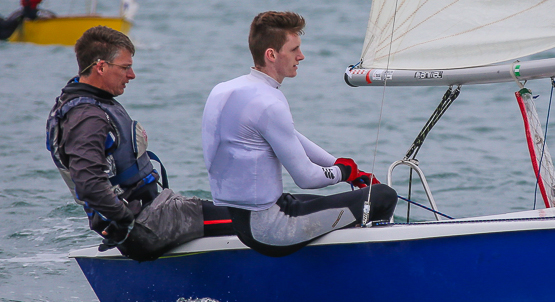
Rs 200 Southern Champions Frank and Kevin O'Rourke
Day two brought lighter breeze with the fleet launching in pretty much 2 knots. Fortunately the breeze filled in from the south as forecast, and the race committee sucessfully manged to get 3 races away, to complete the 6 race series. The newest addition to the RS 200 fleet, also in the newest 200 in Ireland #1566, Jocelyn Hill and Katie Kane from CAYC were the pace setters for the day, but experience prevailed with Frank and Kevin holding on to win on countback from O'Leary and Williamson, (who suffered a small bung related incident), with Joecelyn and Katie taking Bronze.
Some other notable individual race results were Richard Frank and Rose Paget from RstGYC competing in their first RS regional, managing to secure a 2nd in race 5.
The junior division was won by Cullaun SC sailors Mike O'Dea and Sean Hynes, who sailed a great regatta, and coming out tops of the 6 junior boats.
A big thanks to the Race Management Team, lead by PRO Monica, and her able assistant Miriam, who had the unenviable task of running both the RS Southerns, and the club racing on both days. Thanks also to the safety boat crews, who's services Marty and Rachel were very grateful for on Sunday morning!
The next event is the Inland Waterways Ireland Western Championships on the 23rd and 24th of July in Lough Ree Yacht Club.
Ireland's newest harbour and marina facility at Greystones in County Wicklow got a further boost this month with the signing of the lease of the new clubhouse for Greystones Sailing Club just before Christmas.
The lease signed is from Wicklow County Council (WCC) to Greystones Sailing Club, the buildings having been built by Sispar as part of the PPP contract with WCC.
The building has been built to shell and core stage and the Club receives a cheque to fit it out which will take a few months.
The club is not the only construction work in Greystones at the moment, Sispar are building 358 homes next to the harbour, the first of which will be completed this May.
The leases for the new clubhouses of the Angling, Rowing, Diving Clubs and Sea Scouts are expected to be signed in January.
The previous premises of the Sailing and Angling Clubs have been Compulsory Purchased as part of the Harbour Redevelopment Plan and the new ones have double the previous boat parking and clubhouse space.

Cllr Derek Mitchell signs the new lease on behalf of Wicklow County Council
The Sea Scouts, Rowing, & Diving Clubs had no space previously and are getting smaller premise. The clubhouses are close to the sea wall and have been built very strongly as can be seen by the many reinforcing bars in the construction picture. The cost of these Community Clubs is around €4m.
‘These facilities, together with the marina and 2 public slipways, are all part of the Harbour Plan agreed by the Council in 2003, and will produce great marine leisure facilities for Greystones when they are up and running in Summer 2016’, said Cllr Derek Mitchell.
The large public square overlooking the harbour, which will be a central feature for the town, is also progressing well and will be mostly complete by the Summer.
Greystones Club Houses Nearing Completion
#Greystones - Moves are being made to complete developments for five clubs in Greystones Harbour before year's end, as the Wicklow Times reports.
Developer Bridgedale JV recently informed Greystones Municipal District councillors that the €3.5 million facilities are nearing completion after ground was broken in January this year.
The news was welcomed by Cllr Derek Mitchell, who expected the new public square to be completed in June 2016, with a public park to follow in 2019.
This comes after a delay on the development in September over an issue with the transfer of land earmarked for the green space.
New Date For 'Windless' Greystones Regatta is October 4
The AES sponsored Taste Of Greystones regatta will be run again on Sunday Oct 4th with a slightly later start of 12.30 to allow boats sail over to the Wicklow coast. As reported earlier, regatta organiser Daragh Caferky told Afloat.ie that the club hopes to run two races on the day.
Unfortunately, despite a bumber entry of 120 boats for Wicklow's biggest regatta lack of wind forced its abandonment on Sunday. But Cafferky adds 'At the heart of the Taste of Greystones regatta is the social event and whilst the weather may have cheated the sailing it certainly did no damage to the social experience'
An estimated 500 sailors made good use of all the Greystones hospitality and, says Cafferky the marina reported boat parties right through the night.
All entry and registration remains live for Oct 4th so hopefully many of the visitors can make a return trip.
Teenage Powerboat Thieves Pursued By Gardaí
#BoatTheft - The Garda Air Support Unit gave chase to three teenagers on a stolen powerboat along the east coast yesterday (Sunday 24 May), as the Irish Independent reports.
The trio of thieves took the 40ft high-powered yacht from Dun Laoghaire Harbour some time after 5.30am and headed as far as Wexford before turning back towards Wicklow.
After they were spotted near Greystones after lunchtime operating the "incredibly powerful boat in a very reckless manner", they led gardaí on a dangerous chase putting many other coastal boat users at risk.
The Irish Independent has more on the story HERE.
Update: Wicklow News has images of the stolen boat being towed back to the marina by Dun Laoghaire RNLI.


























